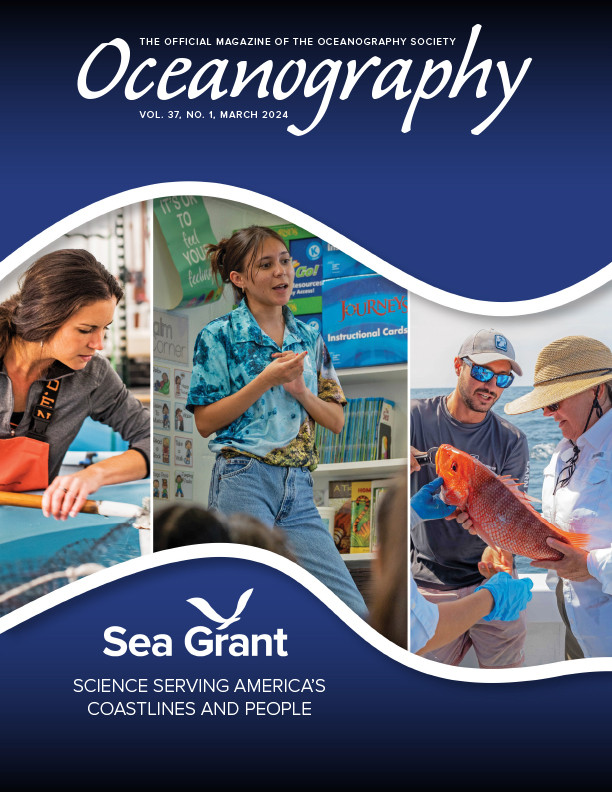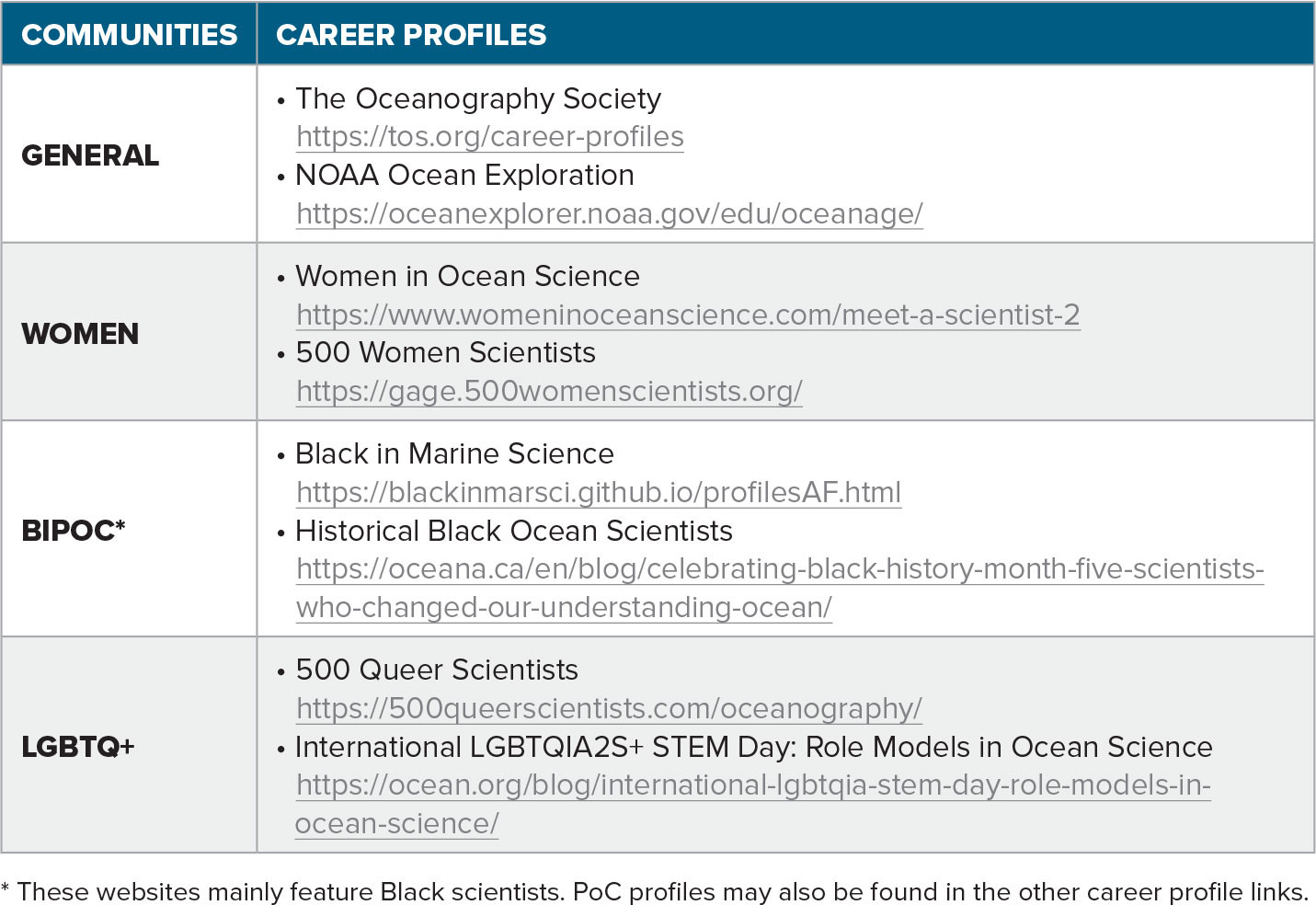Full Text
Leaving graduate school and entering the workforce can be intimidating. The competition for postdoctoral fellowships, tenure-track professorships, and research associate positions creates a challenging environment for recent graduates interested in pursuing a career in academia, causing many to consider changing sectors (Cyranoski et al., 2011; Main et al., 2021; Nerad et al., 2022). However, students are often unprepared to make this professional change because graduate programs are typically designed to prepare them for continuing in academic careers, and mentors are often less familiar with career choices in the non-academic world.
Students and early career researchers who are members of marginalized groups, such as women and LGBTQ+, and those who are Black, Indigenous, and People of Color (BIPOC), face additional challenges during their career transitions. A lack of diversity in marine science and technology has created institutional barriers to entry as well as a potentially unwelcoming culture (Johri et al., 2021). As a result, members of marginalized groups are less likely to receive major research grants or leading authorships, they experience limited research opportunities as well as lack of mentorship, and they have a higher chance of encountering workplace harassment (Giakoumi et al., 2021; Nature Communications, 2021; Lima and Rheuban, 2021; Graham et al., 2023; Legg et al., 2023). These additional barriers can further exacerbate an already challenging career transition.
Despite its challenges, transitioning from graduate school to an exciting career outside of academia is possible. In recent years, people with transdisciplinary experience have been in high demand to handle complex problems in marine governance, conservation, and industry. Ocean scientists are well equipped with skills and working experiences in an interdisciplinary field to tackle complex global problems, such as climate change and coastal and fishery management (Satterthwaite et al., 2022). To embark on this professional journey, it is important for students and early career researchers to act and develop mindsets with openness, positivity, and resiliency for boosting their confidence and exposure. Here, we provide suggestions for achieving a successful transition.
GET INSPIRED
You can broaden your horizons by exploring career opportunities outside of academia. It is helpful to define your postgraduate goals early on rather than waiting until the final year of your degree when you are under pressure to find a job. Ways to become familiar with career options include the following.
Read career profiles and find role models. Role models need not be restricted to people who focus on your research niche. They may inspire in different ways such as their involvement in policy, outreach, education, technology, and justice, equity, diversity, and inclusion (JEDI) work. Table 1 provides examples of sources where you can find general career profiles and those of underrepresented groups in marine science.
Invite non-academic ocean professionals to give seminars. It is beneficial to your development as a professional to branch out and learn from people who work in government, industry, and nonprofit organizations.
Attend job fairs and conferences. These events offer great opportunities to browse potential career options and talk to people who work outside of academia. They often feature career panels made up of members with diverse backgrounds and professions.
Keep an open mind. Being willing to investigate a wide variety of career paths that you may never have considered will be tremendously useful. Some life-changing opportunities could be overlooked unless you have an open mindset.
TABLE 1. Career profiles for ocean professionals. > High res table |
GET CONNECTED
Start expanding your network to include those who work in the sectors that interest you. It’s helpful to make connections with others in your field for advice and support. There are many ways to form these connections.
Attend networking events. These may include conferences, luncheons, mixers, and social hours hosted at your institution or within relevant organizations. Such opportunities can allow you to meet experienced ocean professionals as well as early career peers. A goal of making one new connection at each event will help push you to practice making professional connections.
Arrange informational interviews with people who you would like to meet. Informational meetings are a good way to network with people in other sectors and ask questions about career paths outside academia in informal settings (Knight, 2016). Meetings could occur virtually over a video chat, or if it is a local connection, in person at a coffee shop. Prepare a list of questions ahead of time that will provide you with greater insight into the person’s job.
Join a professional society and surround yourself with people who align with your values. If you are part of one or more marginalized groups, it’s easier to succeed when you have tailored support and a sense of belonging. Professional societies can help amplify your voice and provide resources for creating an equal and fair working environment. Some societies may provide mentorship programs to help guide you along your desired career path.
Build allyship among your peers and a community of support. Allyship refers to “an active, consistent, and arduous practice of unlearning and re-evaluating, in which a person in a position of privilege and power seeks to operate in solidarity with a marginalized group” (https://theantioppressionnetwork.com/allyship/). Allyship requires people with privileges to understand the history of oppression, unlearn behaviors built on privileges, and create space for marginalized groups. This can be practiced by a person of any gender and any generation, including people in mid and late career stages. Building a diverse and inclusive community will significantly benefit your career and foster a new culture in your working environment.
Seek a committee member or a mentor from a non-academic organization. Having a different perspective on your research could be helpful in supporting your project and providing unique guidance on your future career.
GET ACTIVE
Upon deciding on a career path, it is now time to plan your post-graduate job search. Here are steps you can take to get on your way.
Discuss your goals with your graduate coordinator, mentor, or career guidance counselor and look for opportunities that can lead you toward them. These services may be available in your university or scientific societies for free.
Build your experience by participating in your department’s graduate student-targeted opportunities. Examples include co-op programs, internships, lab exchanges, and student workshops. These kinds of programs can provide productive opportunities for learning new skills that are transferable to your future career, while also facilitating new connections outside of your own lab.
Show all your strengths in your resume. Display any relevant experience gained during your graduate studies as well as during other employment, volunteering, or hobbies. It is important to show how your skillset translates to a non-academic setting (Hejazi et al., 2018). Swap your resume with friends or mentors to get feedback.
Organize your own events and get others involved. In the absence of relevant networking opportunities, gather a few friends with similar interests and organize an event, such as arranging fireside chats or informal luncheons with representatives from non-academic backgrounds. These activities will support people in similar positions, and you will gain valuable leadership experience that will benefit you in the future.
Speak up and enact changes in your workplace. For example, define clear JEDI guidelines for your department and institution that can be achieved in collaboration with societies representing the interests of marginalized groups locally or globally. Similarly, self-organizing JEDI-focused groups at the workplace will also help to create a more supportive workplace culture.
Transitioning from graduate school to a career outside of academia can be overwhelming. The difficulties encountered can be exacerbated for people in underrepresented and marginalized groups through systematic discrimination and lack of support. By broadening your search for career information, building a support system, and expanding your skillset and qualifications, you can gain confidence and direction that can help support your entering a new profession. Furthermore, being resilient, optimistic, and adaptable will be immensely helpful in overcoming most challenges during this transitional period.


